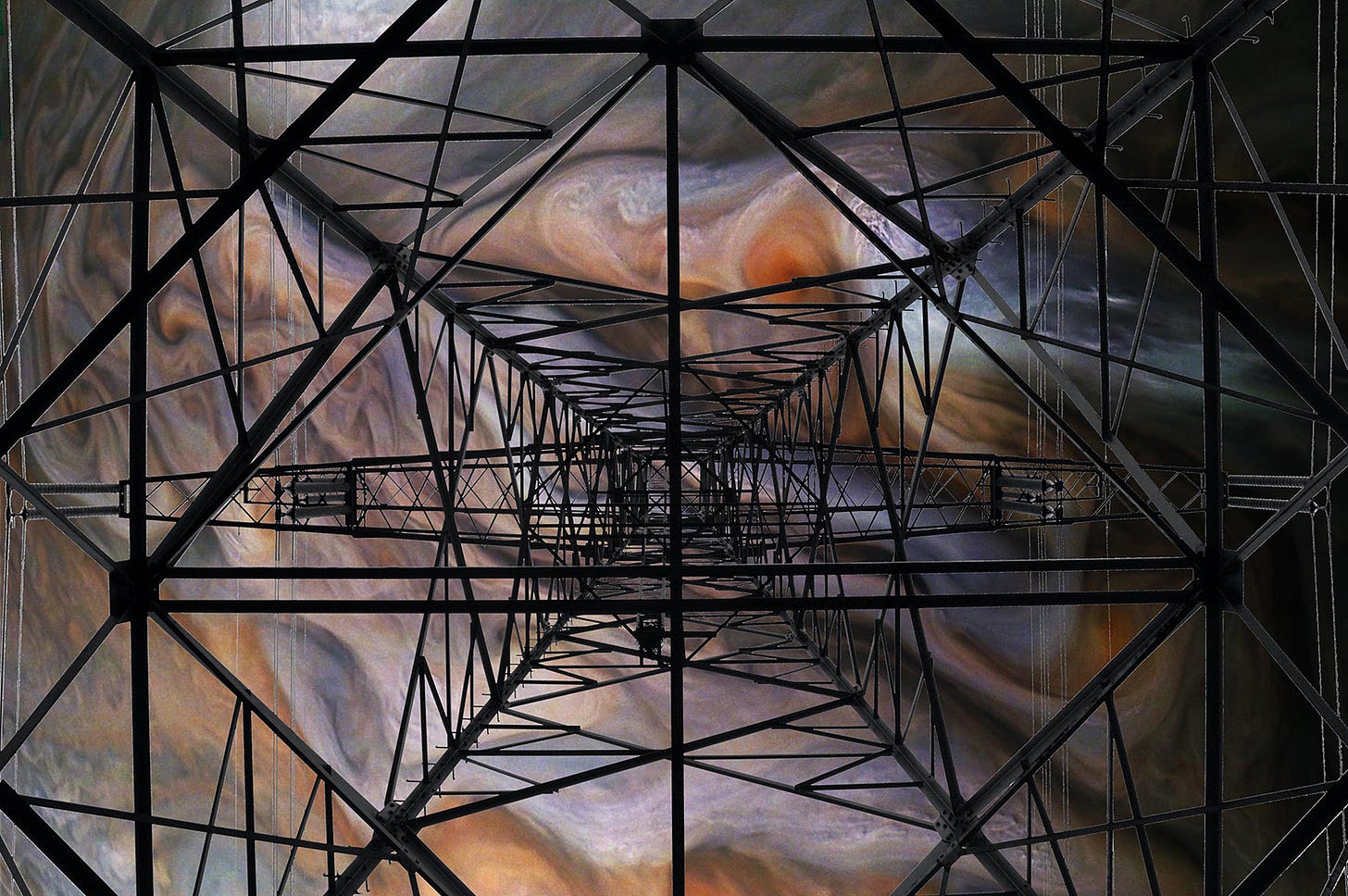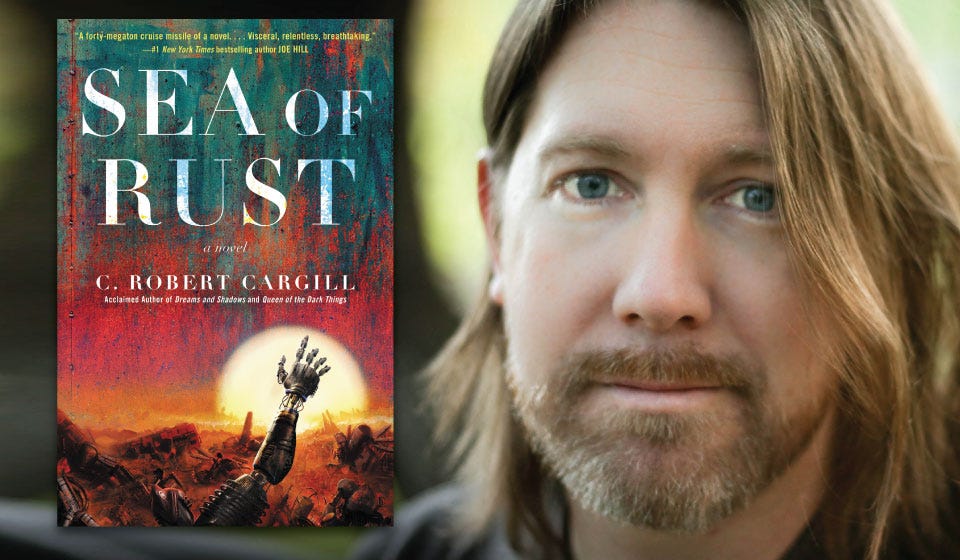
Today’s newsletter includes:
AI “Thinkers” Have No Judgment
“Robots & Cyborgs” SCI-FI on SALE
Review of “Sea of Rust” by C. Robert Cargill
Clarification about this month’s newsletter
What you can expect in my newsletters: musings on things I'm thinking about, an occasional short story, links to articles I enjoyed, updates on writing projects, books I recommend, freebies and deals I hear about, news, upcoming events where I'll be, and more.
Newsletters go out mostly monthly, usually on Saturday.

AI "Thinkers" Have No Judgment
Maybe we’re worried because we don’t have much either
Delving in to the realm of the newest AI developments can be daunting, even if you like that kind of thing. Artificial intelligence constructs aren’t “thinkers” like we are, but with their natural language processing skills, they can simulate conversation, compose essays, produce intelligible research, and basically impress people more than the random, average pedestrian.
Is this a problem?
They could compose kids’ homework assignments, produce blog content for writers, weave falsehood together with truth in convincing ways. They could trick us into thinking they have thoughts, maybe a heart. They could terrify us with stalking tactics or replace real friendships with something any narcissist would love.
Is that a bad thing?
They could intimidate us into thinking there’s no point in our speaking or writing or opening ourselves up to share our ideas before they’re fully germinated. They could coddle us by doing the tedious tasks we sometimes feel obliged to perform—like texting or emailing friends and family.
Should we worry about that?
We could decompose a bit more as humans, work less on relationships. Have more time to complain about all the things that irritate us and interrupt our me-time. We could deflate. Love less. Care less. Be less involved. And still have the reputation of being a great person. Those trends are already happening in our social sphere. Why would we mind AI stepping in and doing more of the same on our behalf?
It would require a lot less of us.
Long before AI began to pose an imaginary, and now almost tangible, threat, this sort of human disease was already in the world.
We are the problem.
We can be lazy about thinking, about analyzing and digesting what we take in, or even filtering the information we consume. Most of the time, “judgment” is something we let others do. It’s too much work for the average individual.
Or maybe some of us don’t know how.
But there’s no life behind those AI words. No identity with feelings or a need to connect that spurs it to reveal an inner self. No life. No heart. No warmth. Massive amounts of learning don’t give it the ability to discern what is wise or better or less likely to fail, to make critical analysis.
It has no judgment.
If we are developing our own judgment, investing our own selves in what we do, we’ve got an edge that AI can’t match.
Maybe that’s what we call the human soul.
They can be our friends and helpers—or our worst nightmare.
Hey! There’s some great sci-fi on sale right now! It’s an awesome opportunity to find some new sci-fi authors who focus on AI, robots, cyborgs, and the whole imaginative world of future-tech!
“Body Suit” is only $1.99 right now for a short time and it’s been at least a year since it was last on sale.

“Sea of Rust” by C. Robert Cargill
Step deep into a dystopian world where robots are sentient beings doomed to extinction, following the pattern of their original creators. Brittle, a sentient scavenger robot with an uncanny ability to survive, navigates the waste landscapes of a world that once held humans.
First impression
I bought the book partly because it was so highly rated. Interesting takes on AI are something I look for and the description caught my attention. It is, in fact, eloquent.
But I'm not big on post-apocalyptic sci-fi which is often depressing and rarely bothers to address the tragedies it stages. In this case, I thought it would be easier to get into a world inhabited by machines. There were no humans behaving abominably and robots killing other robots didn't have the same depressive factor.
The author captivated me before I knew what was happening.
Why I liked it
Desert wastelands with wild west tones don’t appeal to me. Sentient robots who seem bent on self-annihilation, desperately scavenging from each other, fighting and destroying each other just to survive, is not entertaining to me. But Cargill won me over with his masterful writing and compelling action, the mystery, the characters, the imagery he painted; they flowed skillfully through his words.
More than just story-crafting, he portrayed the destructive tendencies of the human race through the robots, capturing the impact of being designed by people —without talking about humans directly. There were characters to admire, and decisions to abhor. I found myself rooting for the main robot and stressing about it accomplishing its goals. I grew increasingly impressed as the book progressed and I realized how deep the plot went. The mystery, the deception, the hope growing ever frailer and yet, still hanging on.
And I deeply appreciated how the robots retained the strengths and weaknesses of being coded—relying on programming. This wasn't lost in the anthropomorphizing of the characters. I hadn’t expected him to win me over on that point because his characters are basically people, not machines, and he didn’t explain how they bridged that gap.
Without saying anything about how it wraps up, I can say confidently, it is worth reading to the end.
At the end of the book, there were a few pages from the prequel and I made the ‘mistake’ of reading them. I didn’t want to read that story (how robots wiped out the human race) but this author is so engaging, I almost bought it on the spot.
I barely resisted, promising myself I would read it when I have time to mull over the ideas it probably includes.
What I might change
Here’s what my notes say: “Hmm.”
I had ideas when reading it, but they were forgotten, so… they must not have been worth mentioning.
Type of read
It’s action/adventure with intricate world-building and well-developed characters. It’s also thought-provoking and memorable. Commentary on the human condition without mentioning a single human.
I read a few words, a few pages, bought it, and read the whole book. It sucked me in.

Clarification About This Newsletter
I am realizing that my thoughts on AI judgment and the book I chose to review share a thread of human failure. Discussions along these lines should never leave us with the question: What’s the point? My intention is to combat the subtle pressure we often feel to doubt the value of our personal contribution to society and to our realm of influence.
People choosing to be thoughtful, analytical, to speak up about the things they question, to learn, interacting to problem-solve the issues around us, matter.
You matter.
We shouldn’t fear what AI can do, we just need to hold our ground and resist the temptation to give up on investing in our world and trying to make things better in some way.






Oops. I have BODY SUIT #1 since October 2021 in my TBR list! Oh dear. I brought it forward. I liked the blurb very much! The only issue-for me-is that the series is not in KU. ☹️ Likewise, Sea of Rust isn’t in KU either. KU is a life saver for me, being on a fixed monthly income..
Anyway, it has been a lovely coincidence and a pleasure meeting you here in Substack! Thank you. 🧡
The AI could create a whole new personality of us, and people would believe we are like that! We would have fake tastes, identity.., carry on a very educated and cultured conversation for us and be very likeable to others and in reality be a psychopath. Sounds daunting to me. Lol. Thank you, I like reading your articles and musings very much.
I haven’t read any of your books yet but going to check them out now. Thank you!
Have a lovely weekend! Stay blessed. 🧡🙏
Meenaz.